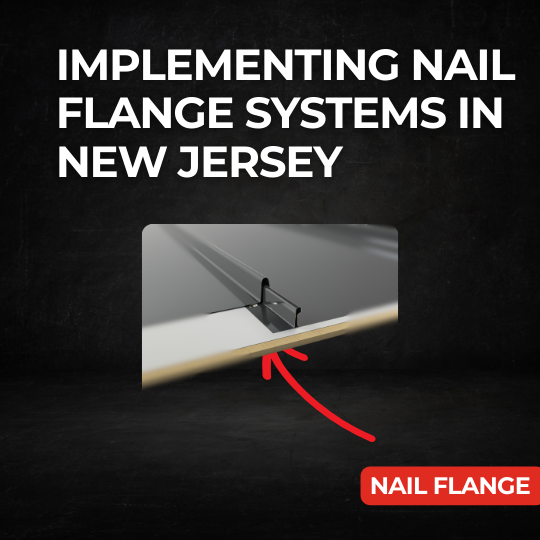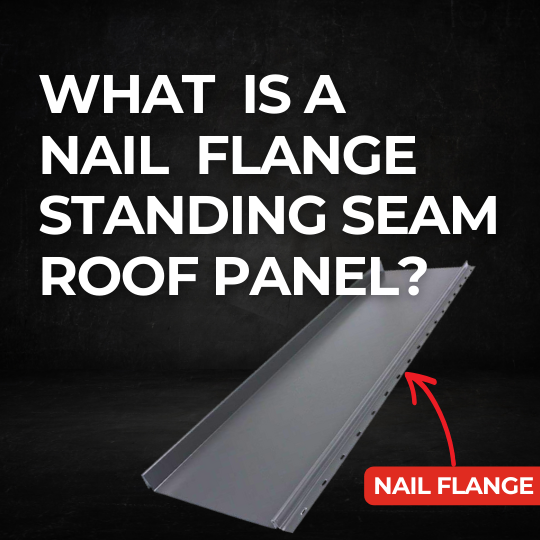Greetings, fellow homeowners! As a seasoned New Jersey roofing company with over 50 years under our tool belts, we’ve seen roofing technologies evolve immensely. Today, we’re here to talk about something that may not be a daily topic at your dinner table but is crucial for safeguarding your home: nail flange systems for metal roofs.
Metal roofing is gaining traction in the Garden State, and for good reasons. It’s durable, energy-efficient, and can handle our wildly fluctuating weather. Within the world of metal roofing lies a gem – the nail flange system – that could be the unsung hero of your next roofing project.
Understanding Nail Flange Systems
Let’s break it down. Nail flange systems, or nail strip systems, are a method of securing metal roofing panels to your roof’s structure. These systems feature a flange with pre-punched fastening points where nails or screws can be driven in to attach the panels. This system’s beauty is in its simplicity and the seamless installation it offers.
So why opt for a nail flange system when considering a metal roof for your New Jersey abode? Here’s a list that might just nail it for you:
Advantages of Nail Flange Systems for Metal Roofing:
Simplified Installation:
The pre-drilled holes in nail flange systems mean your roofing contractor can line up and secure panels with speed and precision. This not only saves on labor time but can also make the whole installation process smoother.
Reduced Leak Risk:
Since nail flange systems involve fewer punctures in your roof, they inherently minimize the risk of leaks. This is a significant plus, especially when our unpredictable Jersey weather decides to test the limits of your home’s defenses.
Enhanced Durability:
Metal roofs are tough cookies, and the nail flange system adds to this resilience. They can withstand the brunt of nor’easters and the occasional heat wave without batting an eyelid, ensuring your home stays protected year-round.
Wind Resistance:
In an area that sees its fair share of stormy weather, knowing your roof can stand up to high winds is a relief. The continuous attachment that nail flange systems provide ensures your metal roof stays put even when the wind howls.
Thermal Movement Accommodation:
Metal expands and contracts with temperature changes. Nail flange systems are engineered to allow for this natural movement, helping to prevent any warping or damage that might otherwise occur over time.
Aesthetic Appeal:
Let’s face it, we all want our homes to look good. Nail flange systems offer a sleek, clean appearance for your roof, free from exposed fasteners, which can be less than pleasing to the eye.
Low Maintenance:
Once installed, metal roofs with nail flange systems require little upkeep. They’re not prone to cracking, eroding, or forming algae or moss, which are common issues with other types of roofing materials.
Energy Efficiency:
With proper insulation and underlayment, a metal roof with a nail flange system can keep your home cooler in the summer and warmer in the winter, potentially lowering your energy bills.
Comparison to Other Roofing Systems:
When you weigh nail flange systems against other roofing options, you’ll find that traditional methods like asphalt shingles or clay tiles, while popular and often less expensive initially, don’t quite measure up in terms of durability and long-term value. Asphalt shingles, for example, are more susceptible to wind uplift and may require more frequent replacement. Clay tiles, while long-lasting, are heavier and more brittle, making them prone to breakage. Let’s dive a little deeper into the comparison:
Longevity:
Asphalt shingle roofs typically last about 15-30 years, weather permitting. Clay and concrete tiles can last upwards of 50 years, but they come with their own set of maintenance challenges. Metal roofs with nail flange systems, on the other hand, boast a lifespan that can exceed 50 years with minimal upkeep. This longevity is a testament to the durability and robust construction that metal roofing provides.
Maintenance:
When it comes to maintenance, asphalt shingles may require periodic replacement of individual shingles due to damage or loss. Clay tiles, while low maintenance, can crack and require replacement. Metal roofs with a nail flange system are virtually maintenance-free. They resist the common issues that plague other materials, such as moss and algae growth, and won’t crack or curl.
Aesthetics:
Aesthetically speaking, the options are varied across roofing materials. Asphalt shingles offer a traditional look and come in a wide range of colors. Clay tiles give a home a classic, Mediterranean flair. Metal roofing with a nail flange system, however, provides a sleek, modern profile and also comes in a variety of colors and styles to match your home’s architecture. The hidden fasteners mean you won’t have any unsightly nails or screws to interrupt the clean lines of your roof.
Cost:
Initially, the cost of a metal roof with a nail flange system may be higher than other roofing materials. However, the long-term savings are where you really benefit. The extended lifespan, coupled with the reduced need for repairs or replacement, means a metal roof often offers a greater return on investment.
Energy Efficiency:
In terms of energy efficiency, metal roofs reflect more sunlight and absorb less heat than asphalt shingles, leading to cooler attic spaces and lower energy bills during hot New Jersey summers. Clay tiles have similar reflective properties but can be less effective in colder climates. The nail flange system allows for a continuous airspace beneath the metal panels, further enhancing the energy efficiency of your roof.
Weight:
Metal roofs are significantly lighter than clay or concrete tile roofs. This means there’s less stress on your home’s structure, and in some cases, metal roofing can be installed over an existing roof, saving the cost and environmental impact of a tear-off.
Environmental Impact:
Metal roofing is also a more environmentally friendly option. It’s often made from recycled materials and is fully recyclable at the end of its life. In contrast, worn-out asphalt shingles contribute to landfill waste and aren’t generally recycled.

Implementing Nail Flange Systems in New Jersey
In New Jersey, where the climate can throw us curveballs from scorching summers to snowy winters, metal roofing with nail flange systems presents an incredibly sensible choice. Not only does it stand up to our diverse weather, but it also complies with stringent building codes designed to protect homes in coastal and high-wind areas.
When considering a roofing project, it’s essential to consult with professionals who understand the local climate and building regulations. Our team at Alte Exteriors, with over five decades of experience in the New Jersey roofing industry, can guide you through the process. We ensure that your metal roof with a nail flange system is installed with precision, complies with all local building standards, and is poised to provide the ultimate protection for your home. We recognize that every homeowner’s needs are unique, and our approach is tailored to meet those individual requirements. From selecting the appropriate metal roofing material to the final inspection of the installed nail flange system, our dedicated professionals are committed to delivering a roofing solution that offers peace of mind, aesthetic appeal, and value for years to come.
